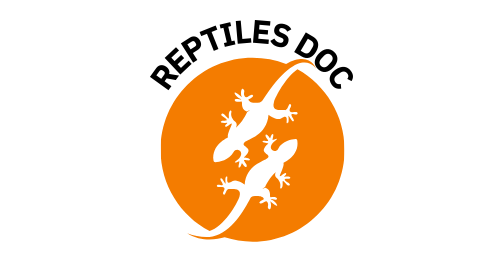Any responsible pet owner, especially of such unusual pets as bearded dragons, would want to make sure that their slimy companion gets the proper nutrition they need. Thus, Can bearded dragons eat mice? Learning whether or not mice could be incorporated into the bearded dragon’s diet may cross your mind.
Indeed, mice are valid food items for varied reptilian species in the wild domain and they cannot be easily excluded by the targeted species. Therefore, it could be expected that since bearded dragons are omnivorous lizards, they, too, could safely eat mice.
However, it is crucial to admit that the issue of bearded dragons and mice is slightly more nuanced than that. Some like to feed their bearded dragons with mice for instance, the truth is though bearded dragons can eat mice, here are all the risks that most pet owners ought to consider.
Well, welcome to this exhaustive review, whereby we will discuss the natural diet of bearded dragons, look at the true aspects of whether or not the dragons can eat mice, and other hidden aspects that you probably will not find in most of the standard bearded dragons’ care guilds.
The Natural Diet of Bearded Dragons
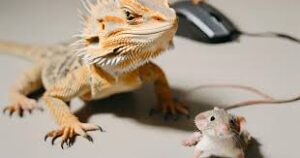
To thoroughly understand how to feed mice to bearded dragons, one has to understand more about their diet preferences in their natural habitat. Yep, the bearded dragons are omnivores, they can feast on plant and animal products.
In their native habitats across Australia, the typical diet of a bearded dragon consists primarily of:
– Insects (including crickets, grasshoppers, beetles, ants and the like)
– Small lizards and skinks of up to 8 inches in length are average animals of this group.
– Garnered flowers, greens, and other plant parts F
– Fruits
As for the last type, mice are also not usually found to a certain extent in the bearded dragons’ diets in the wild. It should also be understood that their jaws and teeth are not specialized for rodents’ predation and consumption. Bearded dragons are comparatively constructed to seize and eat slower-moving prey such as insects and small lizards.
However, contrary to many other lizards, bearded dragons are generally non-selective feeders, which, if they get a chance to feed on living, will take small rodents too. Yet, mice would not be a staple in their diet in the wild as a large part of their diet would be insects.
The Risks of Feeding Mice to Bearded Dragons
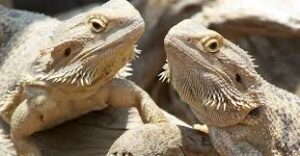
While bearded dragons can physically consume mice, there are several potential health risks associated with this feeding practice that every pet owner should be aware of:
- Choking Hazard
The first issue that comes up with feeding bearded dragons with mice is that of the incidents of choking. Mice, even the small ones, cannot be swallowed safely by your bearded dragon since they are relatively bigger than crickets. Their gigantic bodies can be a big threat and a blockage in the throat of the feeder or even the smaller bearded dragon. However, when the prey is small or medium-sized, they can easily choke the dragon and there will be an inadequate supply of oxygen hence suffocation to death.
- Digestive Issues
As the mice contain more fats and proteins than bearded dragons’ normal diet comprises of, it may pose a problem in digestion in case the dragon is not used to consuming this type of food. Having mice may cause different GI issues such as diarrhea, constipation, or impaction which is a deadly condition that affects the digestive system.
The diet of bearded dragons mainly consists of plants with insects and small lizards consumed only in a moderate amount. Their digestive system is not developed to feed on foods high in proteins and fats like rodents such as mice.
According to Dragon’s expert advice feeding the mice excessively can prove to be fatal for the internal organs of the dragon and can lead to many severe health problems.
- Nutritional Imbalance
Therefore, mice are not suitable for the bearded dragons’ diet as they do not contain all the nutrients that the bearded dragons need for their proper functioning. They do not contain the vitamins, minerals, and other essentials that should form a large part of the diet of this reptile.
Bearded dragons require a proper feeding plan that incorporates the right amount of calcium and phosphorus in their diet plan and adequate vitamins, particularly vitamin A, and vitamin D3 as well as other trace nutrients.
Mice for that matter are not a complete diet for bearded dragons because unlike reptiles mice lack some essential nutrients required by the bearded dragon.
- Potential Parasites and Diseases
A third issue with feeding mice to the bearded dragons is that the parasites or diseases can also be passed on. Suck Rats & mice that are caught freely from the environment are a host to many diseases causing bacteria &
Viruses and also many types of internal & External parasites which can infect your pet. As for commercial breeder mice, although they are often healthier, they may still be carriers of diseases that may prove dangerous to your bearded dragon.
Digesting the infected prey poses your bearded dragon with a very high risk of getting IRR is hard to cure and can even be deadly! Thus, such parasites as pinworms, coccidia as well as giardia are among the diseases that result from feeding contaminated mice.
- Behavioral Changes
Mice should not be given as food to the bearded dragons often because some of the dragons may develop behavioral issues. Reading and filling it to the brutes the high-protein, high-fat diet can affect their natural disposition; they may turn out to be aggressive, territorial, or hard to tame.
Often, this can prove dangerous for both the owner and the dragon that is being possessed.
Furthermore, bearded dragons that are fed mostly mice will develop a Feeling of dependency on this kind of prey to the extent that they will stop eating their usual staple foods including insects and greens. The above-mentioned conditions can also worsen nutritional status and cause severe health issues.
When Mice May Be Appropriate (With Caution)
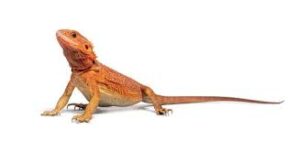
While the risks generally outweigh the benefits, there are a few specific situations where feeding mice to bearded dragons may be appropriate, but only with extreme caution and close veterinary guidance:
- As an Occasional Treat: Live mice, size and type correct for the dragon, should be fed occasionally to the dragon, and should not be the primary sustenance for the dragon, practically they should be about 10% of the dragon’s diet. This should be done cautiously and if any sign of worsening of the mentioned complications appears it should be discontinued immediately.
- For Underweight Dragons: In some instances, mice may be recommended for underweight or starving bearded dragons to put on some weight and muscles but this is only under the vet’s advice and only when taken to an exotic animal vet. However, it is worthy mentioning that untimely feeding of mice or feeding with an improper diet will only worsen the condition.
- For Breeding Females: Occasional supplementing of pregnant or nursing female bearded dragons with mice may be beneficial due to the higher amount of protein and calories that they need; however it must be done sparingly and with consultation with the veterinarian.
In all cases where mice are fed to bearded dragons, the following precautions must be taken:
– Interested individuals must source the mice from commercial breeding and not be captured from the wild. Free-living wild mice are known to be much more likely to be infected with parasites and other diseases.
– The mice need to be of the correct size for either the specific bearded dragon in question or a general size appropriate for bearded dragon consumption. Small pieces are preferred also anything big is a severe menace for choking.
– The mice should be properly cooked, preferably until they are steaming and reach temperature which would eliminate any bacteria.
– The cooked mice must be covered with calcium and vitamin supplement powder to attend to the nutritive needs of the Bearded Dragon
– Rodents should be given sparingly and are not qualified to be produced as a common diet for the dragon.
Despite these precautions though, certain dangers are bound to be involved with feeding mice to bearded dragons. Parents should be very careful and it is advised that this feeding practice should be discouraged altogether and children should be fed with safer and more appropriate foods.
Feeder insects should form the basis for a bearded dragon’s diet as they are rich in protein, vitamins, and minerals that form dragon’s diet. They are also geometrically and proportionally suitable for hunting and feeding which is natural for any bearded dragon.
Greens and Vegetables
– Collard greens
– Kale
– Mustard greens
– Turnip greens
– Squash
– Bell peppers
– Carrots
Based on the earlier findings, approximately seventy percent of the diet of the bearded dragon should be green leafy and other vegetables since they are the sources of nutrients fiber as well as water.
Fruits (in moderation)
– Berries
– Melon
– Mango
– Peaches
– Plums
They should be served as occasional snacks given that they are likely high in sugar and should, therefore, not be incorporated in large amounts into the diet.
Coherently, if you supplement your bearded dragons’ diet with a variety of small insects, fresh vegetables, and a portion every once in a while of the occasional fruits necessary to preserve and maintain your pet’s health, you will not be exposing your bearded dragon to the dangers provided by mice..
Preparing Mice Safely (If You Must)
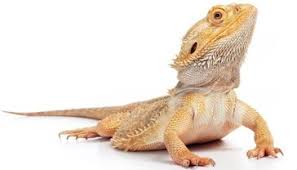
If you do decide to offer mice as an occasional treat for your bearded dragon, it’s crucial to take the proper precautions to minimize the risks as much as possible:If you do decide to offer mice as an occasional treat for your bearded dragon, it’s crucial to take the proper precautions to minimize the risks as much as possible:
- Size Matters: Mice should not be above the size of the space between the eyes of the bearded dragon. This only applies to objects that are small enough to fit into a child’s mouth without any issue, anything that is larger than this is a potential choking hazard that could lead to death. Ensure that portions are accurately measured and the proper size of mice is prepared.
- Thoroughly Cook Mice: The live mice contain bacteria and parasites that can be fatal to your bearded dragon therefore it is recommended to feed them with cooked mice, make sure to bring the internal temperature up to 165°F to kill all the pathogens.
- Dust with Supplements: After the mice are cooked, put them through a quality calcium and vitamin D3 supplement powder. This will assist in seeing to it that your bearded dragon is feeding on proper nutrients to counterbalance the protein and fat from the mice.
- Introduce Slowly: When introducing mice in your bearded dragon diet, you should take a small piece. Pay close attention to their response for the first sixty minutes for any sign of gastrointestinal upset or any other side effect. If they do not have any adverse reactions to it, a gradual progression of the portion size should be made, although it should not be more than 10 percent of the entire diet.
- Avoid Frequent Feeding: Mice should only be given to bearded dragons sparingly because they should not be taken as a regular diet for the dragon. Overfeeding them results in several illnesses that include obesity, organ malfunction, and nutrient deficiency diseases including heart diseases and liver diseases.
Despite these measures, it is not safe to feed mice to bearded dragons because of the following reasons. Caution should be exercised and reliance on this feeding practice discouraged as it poses risks to the health of a child and is deemed unsafe for the child’s nutritional intake.
To sum up, it can be stated that, although bearded dragons can eat soft-furred mice with certain organs removed, it is advisable not to feed these reptiles with such food frequently. These range from choking, digestive complications, and nutritional deficiency, to the spread of diseases, and the danger of such normally overpowers any possible gains.
That is why if you decide to include mice in your rat diets occasionally, you should take the following precautions – feed your rats only mice of the correct sizes which should be domesticated, and store-bought mice which should be well cooked and adequately supplemented.
Bearded dragons should ideally not have mice often and if given, it should not exceed 10 % of the dragon’s diet, it is advisable to observe the dragons for any signs of discomfort or health complications whenever they are fed on mice.
Conclusion
To sum it up, Can bearded dragons eat mice? You should only feed your scaly friend the nutritionally balanced feeder insects; fresh and dark, leafy greens, vegetables, and occasional fruits. Nutrition is one of the major requirements that when met sees your pet bearded dragon live for many years.
In conclusion, the above information should be regarded strictly when it comes to feeding mice to your bearded dragon and should be done with the help of an exotic animal veterinarian. The risks are high, and there are acceptable and more secure options for the occupation.
If you learn to give special attention to its needs and ensure that you meet them adequately then you shall have your dragon for a very long time.
